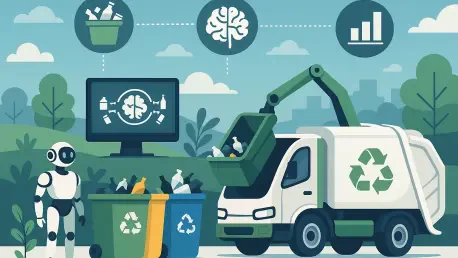Waste management is on the brink of transformation as artificial intelligence (AI) makes inroads into an industry historically bogged down by inefficiency and environmental concerns. Researchers from Monash University and Charles Darwin University have developed a sophisticated AI system, which identifies contaminated wood waste with impressive accuracy. This innovation represents a crucial development for construction and demolition sites, where wood waste often becomes tainted with substances like paint, chemicals, and metals. As the digital age continues to evolve, this AI system’s ability to achieve 91% accuracy in sorting offers a glimpse into the future of smarter recycling methods and sustainable construction practices.
Unveiling Advanced AI Technologies for Waste Sorting
Superior Waste Identification via Deep Learning Models
The adoption of deep learning models such as CNNs and Transformers in waste management is fundamentally altering recycling dynamics by facilitating high-precision sorting processes. These models are trained to recognize contaminations in construction wood waste through images captured by standard RGB cameras. By automating what was once a manual and error-prone task, AI significantly reduces the volume of contaminated wood waste ending up in landfills, thus mitigating environmental hazards. Developing a comprehensive real-world image dataset has proven instrumental in achieving the high accuracy rates reported, underscoring the advancements in AI technology and its practical applications.
This innovative system adapts well to various applications, from integration into camera-enabled sorting lines at waste facilities to handheld tools used in situ. The flexibility and scalability of AI-driven processes allow waste management companies to enhance operational efficiency, reduce landfill contributions, and ultimately realize broader environmental benefits. By using cutting-edge technology, wood recycling becomes an essential component of environmentally responsible construction, contributing to more circular economic models. Technology’s pivotal role in advancing waste sorting processes can be seen as part of a broader effort to embrace sustainable practices across industries.
Bridging Technologies with Circular Economy Goals
Beyond technological advancements, the trend towards AI-driven solutions highlights the broader shift towards achieving circular economy objectives. This shift is fueled by the need to reclaim and repurpose materials more efficiently, which is vital in the construction sector. The AI system’s capability to streamline waste separation processes enables contractors and recyclers to maximize resource recovery, reducing dependency on raw materials and landfill. As circularity becomes more ingrained in industrial practices, AI-powered technologies drive a collective movement towards sustainability and resourcefulness.
The real-world implications of deploying such AI systems are vast, encompassing reduce, reuse, and recycle principles that minimize environmental impacts. By incentivizing the reclamation of recyclable materials, the technology aligns with global sustainability goals, offering impactful ways to diminish the construction industry’s environmental footprint. Recyclers and contractors gain a competitive advantage by implementing processes that underscore their commitment to ecological responsibility while benefiting from enhanced resource efficiency.
Transformative Impacts on Waste Management Practices
Underpinning the Sustainable Construction Movement
The integration of AI in waste management signifies a transformative era for sustainable construction. The innovative AI developed offers solutions to the persistent challenges of managing construction and demolition debris. As traditional methods often fall short in identifying contaminants efficiently, this leap in technology addresses such shortcomings by providing reliable and automated sorting options. Consequently, construction firms can engage more confidently in green building practices, knowing waste reduction goals are more achievable than ever.
AI’s beneficial impact reaches beyond operational improvements, fostering industry-wide norms that prioritize environmental stewardship. By championing intelligent waste management practices, companies demonstrate proactive approaches to sustainability, which is crucial in an era marked by environmental consciousness. The successful embedding of AI-driven waste solutions into everyday operations sets a precedent for other sectors to harness technology for eco-friendly endeavors, emphasizing AI as a catalyst for positive environmental change.
Emphasizing the Need for Continuous Innovations
While current AI developments in waste management present promising outcomes, the push for continuous innovation remains vital. The industry must maintain momentum in exploring novel AI applications and refined models to address evolving waste management needs. Collaborative efforts between technology developers, policymakers, and industry leaders are critical in navigating future challenges. Building on existing advances can spur the development of more sophisticated tools, driving sustainability across the board.
Monitoring AI’s role in the waste sector and adjusting strategies accordingly equips industry stakeholders with valuable insights into areas requiring attention or improvement. Commitment to ongoing research and development fosters an adaptive environment where AI solutions not only meet present demands but anticipate future ones. By prioritizing sustained investment in technological innovations, the waste management sector positions itself at the forefront of an environmentally conscious society.
Future Considerations for AI and Waste Management
The realm of waste management is poised for a remarkable transformation as artificial intelligence (AI) penetrates an industry plagued by inefficiencies and mounting environmental concerns. Innovative researchers from Monash University and Charles Darwin University have pioneered an advanced AI system, adept at detecting contaminated wood waste with remarkable precision. This breakthrough holds significant importance for construction and demolition sites, where wood waste frequently becomes marred by elements like paints, chemicals, and metals. Amidst the digital age’s relentless progression, this AI system’s extraordinary 91% sorting accuracy unveils a promising outlook for more intelligent recycling techniques and eco-friendly construction standards. As this technology continues to evolve, its implications extend to broader environmental sustainability efforts and resource optimization, highlighting the potential for AI to revolutionize traditional waste management processes toward a greener future.









